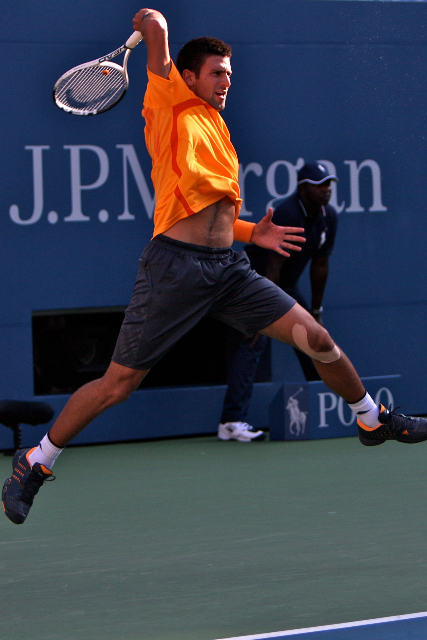Match Point … Relax! But How?
Five Steps to Closing Out a Match

How many times have you found yourself in a match in which you were just a few points or games from winning? Maybe the score was 6-3, 5-2, and you began to think, “This is great. I’m going to be the champion!” or, “Only four more points and the trophy’s mine!” or even, “My friends are going to think I’m the greatest when I win.” In another situation, you might be even closer to the “finish line.” Maybe this time, you are leading 6-2, 5-4 and serving in the crucial last game when you began to think, “Just one more game.” All weekend warriors, tournament players and professional players have had these thoughts. The question becomes, “How many of them have succumbed to such thoughts and went on to lose the match?” The answer is, “Many!” While it is true that many professionals and top-ranked players may lose their focus during critical times in a match, the truly mentally tough competitors become aware when this happens and are able to change and regain their focus immediately.
Paradoxically, losing focus is not horrible. In fact, it is a natural occurrence. The key is being aware that you lost your focus and then changing it to bring yourself back to the present. The problem is that when it’s happening, you may swear that you are concentrating. And you probably are—just on the wrong thing. Focusing on the events of the future immediately removes you from the present moment and takes you to a place where you have no control. Furthermore, as your thoughts drift into the future, you lose touch with what’s really important and what brought you to this point: Playing without thinking, relying on your feel and natural instincts, and trusting your game—the game that got you to this moment in the first place.
When you lose focus, you are not only in the wrong “time zone” mentally, but you also begin to get tight physiologically as the blood flow is diverted away from your hands and feet toward your deeper muscle groups, and your breathing becomes labored instead of deep and rhythmic. Next comes a loss of feel for your strokes: You are no longer focused on what you can control, but begin worrying about your opponent, what others are going to say, and how you will explain the loss. All of these physiological responses, combined with future-oriented thinking, cause your game to spiral more out of control, particularly as you lose the next point and gasp for breath, grip the racket tighter, and try to find that elusive feel you had earlier.
So, what can a player do? No doubt this is a difficult situation, but by employing the following five mental-toughness strategies—especially when you find your game spiraling out of control—you can give yourself the opportunity to get back on track and turn things around:
Become aware
The first step to combating loss of focus is to become aware that you have indeed lost it. When we talk about “concentration” in the sports arena, we are referring to the ability to focus on what’s important and let go of everything else. All players lose their focus at times; it’s inevitable. The truly mentally tough players, however, understand this. They don’t beat themselves up when it happens and they immediately bring their focus back to what they can control. Remember Arthur Ashe in the 1975 Wimbledon final against Jimmy Connors at changeovers? That towel over his head served as a blanket that allowed him to center himself and bring his attention back to the present moment.
Refocus on the present
This is imperative, but where do you begin? First off, know that it takes a lot of courage and discipline to mentally refocus. However, what’s the alternative? A free fall! To refocus, bring your attention to your breath. Your breath is always completely present: Just listen to it and its rhythm, sound, and feel as it enters and leaves your body. Or, visualize yourself breathing relaxation in and breathing stress out, slowly letting go of the stressful air as you visualize it dissipating, like on a cold morning. Another present-moment awareness exercise is to breathe in through your nose to the count of three (if possible) and out through your mouth to the count of four. Or make up your own pattern. These relaxing breathing patterns will help you to stay calm, relaxed and mentally present during the most difficult transitional moments of a match. Other present-moment exercises to try include visualizing the feel of a shot, your rhythm, target zones, and shot patterns. These can all act as “anchors” to make you feel calm.
Change focus
Inevitably, athletes tend to lose focus when they think about a future moment, such as what might happen on the next point. Thinking about the consequences of a weak shot, or even of an injury or stressor that occurred on or off the court, might also cause you to lose your concentration. The key here is to recognize this loss of focus and bring yourself back to something that you can control.
Let go of winning and of expectations
Remember, you cannot control whether you win or lose, or whether or not you hit a winner—your opponent has a say in that. Likewise, you cannot control the expectations others have of you. Paradoxically, the harder you try to close out the match point and win, the more physically tight you will become. Just play each point the best you can; if you do this, you will put yourself in the best position to win. If you don’t win, you can walk away feeling positive about your effort.
Trust the process
Bring your attention to what you have to do to win the crucial point, which might include staying relaxed, returning the ball deep, or serving into your opponent’s backhand. Ask yourself what it would feel like to hit a great serve. Your body knows; now is the time to trust it. Then ask yourself what it would feel like to play this point relaxed, and instinctually you will feel a release. In The Inner Game of Tennis: The Classic Guide to the Mental Side of Peak Performance, author W. Timothy Gallwey talks about letting your body play the way it knows how to without interference from your (thinking) brain.
Using the strategies suggested above will provide you the best possible chance of winning the next point or game and closing out the match. That’s because they help you to begin the point in a calm and relaxed, in-the-moment place. Remember, match point … relax! Now you know how!






